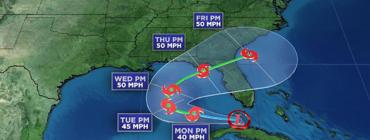
Florida is bracing for strong winds and heavy rains which will soak the Tampa Bay area and the western portion of the state later this week.
Last week, the National Hurricane Center warned Floridians there was a 70 percent chance of tropical storm system Invest 99L turning into a tropical cyclone over the next five days.
Those predictions became a reality Sunday evening, when the tropical disturbance was upgraded to a tropical depression. The depression is expected to strengthen into a tropical storm later Monday or early Tuesday.
Tropical Depression Nine will have a slow start in the southern Gulf of Mexico. On Monday, the storm was hovering over part of western Cuba, 170 miles west-southwest of Key West.
The storm is expected to move slightly north and then east over the next few days, making landfall in Florida Thursday. The heaviest rainfall and brunt of the storm will happen late Wednesday to Thursday.
The NHC expects Tropical Depression Nine to become a tropical storm as it approaches the Florida Gulf Coast, but forecasters weren’t entirely sure how intense the storm would become. A wind shear is necessary for the storm to intensify.
State officials and emergency operations centers were meeting and strategizing for the remainder of the week. Meteorologists predict the storm will produce strong winds of up to 50 to 60 miles per hour and cause large amounts of flooding in certain parts of Florida.
Gov. Rick Scott has cautioned Floridians to be watchful of the storm, speaking with Florida Division of Emergency Management officials Sunday to determine the storm’s impact on the Sunshine State.
“Floridians know that this time of year weather can change rapidly and being prepared is the best way to keep your family safe,” said Gov. Scott.
Officials said they would continue to track the storm as it moved throughout the Gulf of Mexico.
“We will continue to monitor this storm and stand ready to respond to any impacts this system has on Florida communities,” said FDEM director Bryan Koon.
The governor also warned Floridians about standing water, which is the prime breeding ground for mosquitoes transmitting the Zika virus.
“With heavy rainfall expected across South Florida and a potential for flooding, it is important that everyone does their part to combat the Zika virus. Any amount of standing water can serve as a breeding ground for mosquitoes and everyone should dump the water around their homes and businesses following this storm,” Scott said.
The next names on the 2016 Atlantic Storm name list are Hermine and Ian.
Reach reporter Allison Nielsen by email at allison@sunshinestatenews.com or follow her on Twitter: @AllisonNielsen.


